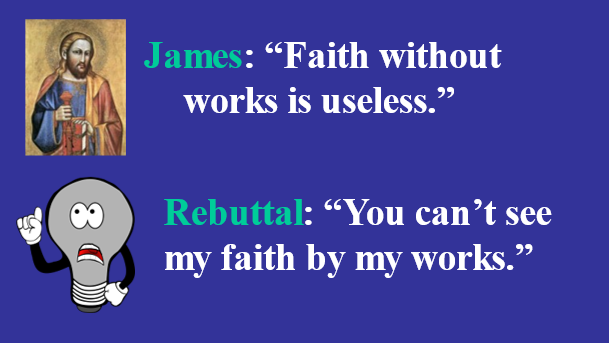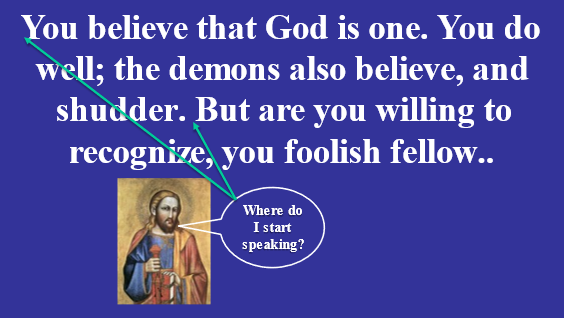The Book of James: Is faith manifested by works?
length: 64:48 - taught on Mar, 7 2023
Class Outline:
Tuesday March 7, 2023
James is writing to Christians who need to change [in the worst way]. James’ theme, to live out your Christianity despite the pressure not to, is not being accepted by most [or so it seems].
James’ anticipates their response.

James: “Faith without works is useless.”
Rebuttal of the unworking Christians: “You can’t see my faith by my works.”
This is the rebuttal that James’ expects, and so in his letter he’s going to invent an objector to say just this and then he’s going to shoot him down under the weight of truth.
[We start with the situation. Christians with no works.]
What use is it, my brethren, if someone says he has faith but he has no works? Can that faith save him? 15 If a brother or sister is without clothing and in need of daily food, 16 and one of you says to them, "Go in peace, be warmed and be filled," and yet you do not give them what is necessary for their body, what use is that? 17 Even so faith, if it has no works, is dead, being by itself.
As we have seen, James is writing to the very early church about living the Christian life rather than believing it and not living it.
Theme: Despite the pressure, be who you are in Christ and live out your faith.
The purpose of James’ letter is to strengthen believers to do just that. In this light, the sticky passage, 2:14-26, becomes rather easy, and freeing. Faith without works is not abundant life.
And James understands that his words are not going to go unchallenged. Even among Christians, the impulse to make excuses for our behavior can be strong.
James understands that many who read these words are going to be convicted. Some of them will receive his instruction with humility.

Whoever loves discipline loves knowledge,
But he who hates reproof is stupid.
James anticipates those who will fit this category.
So, what James does is a common technique for debaters. James makes an imaginary objector.
The problem with this passage has been the confusion as to the exact extent and meaning of the objector’s words. We must know that punctuation is not in the original manuscripts, so it is added by translators. For the most part this is pretty easy to do for linguists. But here, it’s a little inconclusive.
But someone may well say, "You have faith and I have works; show me your faith without the works, and I will show you my faith by my works." 19 You believe that God is one. You do well; the demons also believe, and shudder. 20 But are you willing to recognize, you foolish fellow, that faith without works is useless?
Notice where NASB puts the punctuation marks. According to them, the objector stops speaking at the end of vs. 18. If that is true, James starts his response in vs. 19. The NKJV has the objector only saying, “You have faith and I have works.”
What James is using is argumentative discourse and so its pretty important that we not mix up the words of the objector and the words of James.
What we’re going to see is that it is much more likely that the objector says all of vs. 19. The reason is the second “but.”
The objector starts with “But someone may well say …” and it would fit the pattern if James’ reply starts with “But are you willing to recognize …” The part in question is vs. 19. And it is a part that is used in deceptive ways by those who want you to believe that simple faith in Christ doesn’t save you; that it has to be a certain kind of faith.
We must remind ourselves that James is writing to believers. This is clear.
Let’s see where is the best place to put the quotation marks, i.e., what does James’ imaginary objector say.
But someone may well say, "You have faith and I have works; show me your faith without the works, and I will show you my faith by my works." 19 You believe that God is one. You do well; the demons also believe, and shudder. 20 But are you willing to recognize, you foolish fellow, that faith without works is useless?
There is good reason to believe that the objector’s words include vs. 19.
Let’s establish that first and then interpret his meaning.

You believe that God is one. You do well; the demons also believe, and shudder. But are you willing to recognize, you foolish fellow …
You will say to me then, "Why does He still find fault? For who resists His will?" 20 On the contrary, who are you, O man, who answers back to God? The thing molded will not say to the molder, "Why did you make me like this," will it?
In this passage in Rom 9, Paul is using the same technique as James. He invents an objector to ask the question we’re all going to ask, “Why does He still find fault?” And how do we plainly see that this is all the objector says? Paul responds with “On the contrary…” In like fashion it would seem that James’ response starts at “But are you willing…”
Paul uses the same technique in 1Co 15.
But someone will say, "How are the dead raised? And with what kind of body do they come?" 36 You fool! That which you sow does not come to life unless it dies;
Using these two passages, it seems more likely that James’ reply starts at vs. 20. Now let’s see what it means.
But someone may well say, "You have faith and I have works; show me your faith without the works, and I will show you my faith by my works." 19 You believe that God is one. You do well; the demons also believe, and shudder. 20 But are you willing to recognize, you foolish fellow, that faith without works is useless?
The objector starts with an identification. “You (say, James) have faith and I have works.” Then he makes a demand - “show me your faith and I will show you mine.” I paraphrase for a reason. There are some details that need to be worked out, but those details will become a lot easier to see when we see the passage as a whole.
Manuscript evidence tells us it could be either one:
“show me your faith without (choris) the works …”
“show me your faith from (ek) the works …”
We have another technical issue. These are called textual variants. Many manuscripts do not have the word “without” (choris), but the work “from” (ek). [This is not a scribal error. The words are too different for it to be a mistake, say an en instead of ek. It would seem that over time as manuscripts were copied, someone changed either ek to choris or vice versa. Ek fits better because it is used in the next line, “I will show you my faith ‘from’ my works.”] We cannot say for sure which one is right, but what we can say for sure is that the objector’s reasoning, whatever it is, is foolish. James’ response is that he is a foolish fellow and that he doesn’t recognize that a person’s faith can be shown by his works.

Theme of JAM 2:14-26; Faith is shown by works.
But are you willing to recognize, you foolish fellow, that faith without works is useless? 21 Was not Abraham our father justified by works when he offered up Isaac his son on the altar? 22 You see that faith was working with his works, and as a result of the works, faith was perfected; 23 and the Scripture was fulfilled which says, "AND ABRAHAM BELIEVED GOD, AND IT WAS RECKONED TO HIM AS RIGHTEOUSNESS," and he was called the friend of God. 24 You see that a man is justified by works and not by faith alone. 25 In the same way, was not Rahab the harlot also justified by works when she received the messengers and sent them out by another way? 26 For just as the body without the spirit is dead, so also faith without works is dead.
James’ point is obvious. Faith without works is dead and a person’s faith (not for salvation, but for the Christian life) is justified by works, and he cites Abraham and Rahab as examples.
So, if Abraham is touted as a man of great faith, but he says no to God’s command to offer Isaac, then that statement isn’t justified. If Rahab says she believes the God of Israel will destroy Jericho, and she did, but then she ratted out the spies, what she said about her faith would not be justified.
James is telling us that if we claim to believe the power and magnificence of God’s life, we do not justify our claims if we don’t live it.
This is not the same justification that Paul speaks of in Rom 3-5. Paul is speaking of the justification of the believer who has fulfilled the law through faith in Christ. James is talking about the believer who either continues to live in that which they have been delivered from, sin; or who walks and lives in the light that is the life of Christ in them.
With the whole context in mind, let’s return to the objector’s argument.
The technique is a method called reductio ad absurdum [sounds like a Harry Potter spell, but it is a method of trying to reduce someone’s claims to absurdity). The objector is saying, “It is absurd that you think faith can be demonstrated by works.”
The objector is stating that there is no connection between faith and works.
“For the sake of argument, let’s say you have faith and I have works. Let’s start there. You can no more start with what you believe and show it to me in your works, than I can start with my works and demonstrate what it is that I believe.”
The objector is confident that both ways are impossible.
But someone may well say, "You have faith and I have works; show me your faith without the works, and I will show you my faith by my works." 19 You believe that God is one. You do well; the demons also believe, and shudder.
The objector:
Works cannot demonstrate faith.
Then, the objector still speaking, demonstrates with an illustration.
The objector:
“Men and demons both believe the same truth (one God), but their faith doesn’t produce the same response.”
What is that response? For the man - “You do well.” This actually means that yes, he is doing well.
If, however, you are fulfilling the royal law according to the Scripture, "YOU SHALL LOVE YOUR NEIGHBOR AS YOURSELF," you are doing well.
For the demon, however, the response to his faith in the one God is pure fear.
So, the purpose of this is simply a made up argument given by James who anticipates the many objectors who will read his letter. They will say that faith cannot be seen in works and they will think of illustrations that they will say proves their point. The one James thought of was the faith in the same thing by both men and demons and the drastically different outcomes of that faith. So, they would conclude, “James, you can’t tell me my faith is dead by looking at how I live. Faith is not manifested in works.”
That is the point of the objector James invents. And then James dashes this argument to pieces by using Abraham and Rahab as examples.
The point: Don’t make dumb excuses.
Theme: Despite the pressure, be who you are in Christ and live out your faith.
And James had just stated that we will all be judged by Christ. So even if you do convince some on earth that your faith is not manifested by works, you are not going to convince the Lord with any argument. Just do it.
What we need to take from this is the right answer to the question of whether there is any connection between faith and works.
Is faith purely invisible and never manifested? Or, if it can be manifested, can anyone see it for sure? Abraham and Rahab prove the point.
This wouldn’t have been a new argument. The church understood the religion of Pharisees who said one thing and did another. In the church, the heavy emphasis on the new truths concerning Christ and His work were creating believers who filled their heads with orthodoxy and were neglecting good deeds. Challenging them made them defensive and argumentative.
James’ response to the flimsy argument is that faith without works is dead. Which is what he already said. He calls the argument foolish.

If our faith cannot be manifested in life by divinely good deeds, it cannot be all that valuable.
James is using the word justification to describe a Christian life lived the way it was designed to be lived. Justification means that a person does not incur the penalty of a crime or fault, i.e., an acquittal. Living worldly comes with pain. Living spiritually acquits a believer from the pain and heartache that attaches itself to worldly living.
So then, between James and Paul there are two different kinds of justification. One is the justification of the person unto eternal salvation.
But are you willing to recognize, you foolish fellow, that faith without works is useless? 21 Was not Abraham our father justified by works when he offered up Isaac his son on the altar? 22 You see that faith was working with his works, and as a result of the works, faith was perfected; 23 and the Scripture was fulfilled which says, "AND ABRAHAM BELIEVED GOD, AND IT WAS RECKONED TO HIM AS RIGHTEOUSNESS," and he was called the friend of God. 24 You see that a man is justified by works and not by faith alone.
For if Abraham was justified by works, he has something to boast about, but not before God.
The other is the justification of life which the believer walks in faith and works.
Then James adds that Abraham’s faith was matured (made perfect) by his works.

When we do God’s works by faith, our faith matures.
And, there is an added bonus to using Abraham as an example. The situation of Abraham represented his supreme trial, and trials are a part of James’ theme.





